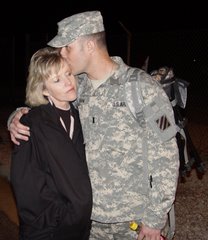 Lt. Col. John Kolasheski, from Louden, Tenn., commander of 3-1st Cavalry Regiment, congratulates Col. Emad, commander of the 3/1 National Police Brigade, following the brigade's seizure of a large cache southeast of Baghdad, April 13. The policemen seized the cache after receiving a tip from a local citizen. More than 540 anti-tank mines, 29 120 mm mortars, seven 107 mm rockets and five rocket propelled grenades were hidden on a truck under piles of hay.
Lt. Col. John Kolasheski, from Louden, Tenn., commander of 3-1st Cavalry Regiment, congratulates Col. Emad, commander of the 3/1 National Police Brigade, following the brigade's seizure of a large cache southeast of Baghdad, April 13. The policemen seized the cache after receiving a tip from a local citizen. More than 540 anti-tank mines, 29 120 mm mortars, seven 107 mm rockets and five rocket propelled grenades were hidden on a truck under piles of hay.  A cache seized by the 3/1 National Police Brigade southeast of Baghdad, April 13. More than 540 anti-tank mines, 29 120 mm mortars, seven 107 mm rockets and five rocket propelled grenades were hidden on a truck under piles of hay. The policemen seized the cache after receiving a tip from a local citizen.
A cache seized by the 3/1 National Police Brigade southeast of Baghdad, April 13. More than 540 anti-tank mines, 29 120 mm mortars, seven 107 mm rockets and five rocket propelled grenades were hidden on a truck under piles of hay. The policemen seized the cache after receiving a tip from a local citizen. By Maj. Joe Sowers
3rd Brigade Combat Team, 3rd Infantry Division Public Affairs Office
FORWARD OPERATING BASE HAMMER, Iraq – Policemen from the 3rd Brigade, 1st National Police Division seized a large weapons cache southeast of Baghdad, April 13.
The 3/1 NP Brigade works in partnership with the 3rd Squadron, 1st Cavalry Regiment, in the city of Jisr Diyala, southeast of Baghdad across the Diyala River.
Lt. Col. John Kolasheski, from Louden, Tenn., commander of 3-1st Cav. Regt., said the NPs received a tip from a local citizen that munitions were being transported through the area. Policemen quickly identified an abandoned truck stacked with hay that matched the description from the informant. Soldiers from Troop C, 3-1st Cav. Regt. moved to the scene to help secure the munitions and facilitate proper disposal.
The cache consisted of 541 anti-tank mines, 100 rocket fuses, 29 120 mm mortars, seven 107 mm rockets and five rocket-propelled grenades. Explosive ordnance disposal Soldiers determined the cache was too big to safely dispose of on site. Troop C Soldiers subsequently secured the cache and moved the munitions to Combat Outpost Cashe nearby.
“We believe the cache was moved up the al-Kut highway to be broken down into smaller packages for movement into Baghdad,” Kolasheski said.
Kolasheski said pressuring extremist networks and partnering closely with the Iraqi security forces contributed to local residents forwarding the information that led to the munitions seizure.
“We believe the pressure we’ve put on Shia extremists in the Village 10 and Besmaya region (communities southeast of Baghdad) facilitated the tip coming to the NP,” Kolasheski said. “We’ve been working our partnership with the 3-1 National police since July of 2007. We believe that setting that as a priority early on is bearing fruit.”
Kolasheski said that both the confidence of the NPs and the trust of local citizens in the brigade have increased during the past year.
When violence increased in Jisr Diyala in late March, Kolasheski said intelligence tips to the NPs from both Sunni and Shia citizens “went through the roof.” According to Kolasheski, Sons of Iraq groups volunteered to assist the NP brigade in clearing criminals from the area during the week-long period of increased violence.
Within the last week, the 3/1 NP Brigade detained one brigade-level and one squadron-level high value individuals and assisted the 3-1st Cav. Regt. in the detention of a Multi-National Division - Center HVI. All three are suspected of murder and attacks against ISF and coalition forces.
“Success breeds success, and in this case, they (the NPs) have increased confidence and leaders that care,” Kolasheski said. “What we wanted to do was build trust in the Shia and Sunni communities, so local residents see the national police as a national force and not an instrument of sectarian violence.”
The 3-1st Cav. Regt. is assigned to the 3rd Brigade Combat Team, 3rd Infantry Division, from Fort Benning, Ga., and has been deployed to Iraq since March 2007.





No comments:
Post a Comment